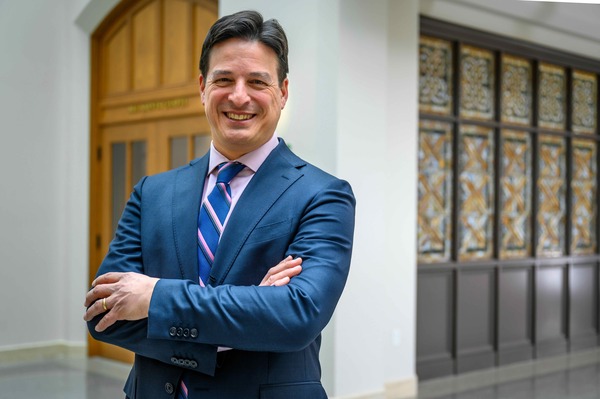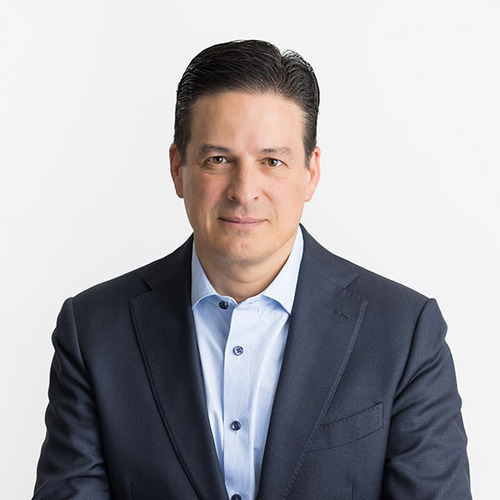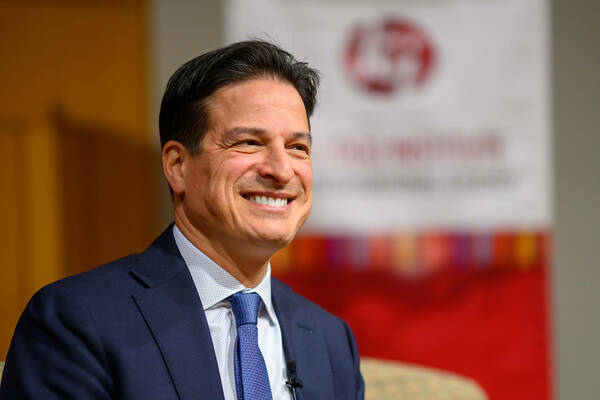Faculty Profile: Professor Paolo Carozza, Leading Expert in International Human Rights and Comparative Constitutional Law

As a Notre Dame Law School professor and concurrent professor of political science, Professor Paolo G. Carozza’s areas of expertise include international human rights and comparative constitutional law. Having recently concluded a five-year tenure on the Venice Commission, Carozza will continue his work in international human rights on the Meta Oversight Board. As an international human rights lawyer, his work applies human rights law to address contemporary questions, bringing legal insight and expertise to the implementation of democratic institutions and online content moderation in the 21st century.
Venice Commission
In 2019, Carozza was appointed by the United States to serve on the European Commission for Democracy Through Law, commonly known as the Venice Commission. As the Council of Europe’s body of independent experts in constitutionalism, the rule of law, democratic institutions, and human rights, the Commission was formed in 1992 to ease the democratic transitions of Eastern European nations after the collapse of the Soviet Union, but has since grown to 62 members from various continents.
The Venice Commission receives opinion requests from member states or Council of Europe institutions regarding the compatibility of constitutional and legislative reforms with European and international standards. Although its opinions are formally only advisory, Carozza says the Commission “is impressive in how influential its decisions have been.”
While on the Venice Commission, Carozza was involved in a wide range of constitutional issues across countries as diverse as France, Turkey, and Kyrgyzstan. He worked extensively on the reform of the constitutional court of Ukraine, while also producing two Venice Commission opinions on Chile’s efforts to draft a new constitution.
“In my experience, it’s really helpful and important for someone to serve on the Commission who knows and appreciates the U. S. constitutional system compared to others. That perspective helps to identify the distinctive contributions that the U.S. constitutional tradition can still make in the world,” Carozza said of his unique role as the U. S. appointee.
Carozza concluded his tenure with the Venice Commission earlier this year.

Meta Oversight Board
Adding to his impactful roles, in 2022 Professor Carozza was appointed to the Meta Oversight Board, a group responsible for reviewing online content moderation for Meta’s platforms, including Facebook, Instagram, and Threads. The Oversight Board includes 22 independent experts, responsible for making binding decisions related to specific content on Meta’s platforms, as well as broad policy recommendations to Meta regarding its content moderation policies.
In what Carozza described as a kind of “quasi-judicial role,” he works with other members to select among millions of appeals, determining where content should be removed or retained on Meta’s platforms.
“We select the cases specifically with an eye towards things that are emblematic of larger systemic or structural challenges in the digital information ecosystem,” he said.
The Board’s policy recommendations address broad and fundamental issues relating to Meta’s community standards, and transparency and accountability in the way that those standards are implemented and enforced, including through automated processes.
Institutional independence, Carozza said, is critical to the Oversight Board’s success. Several factors of the Oversight Board support its independence as a decision-making body: Its members are reputable experts from a variety of sectors, including academics, legal practice, government, and journalism; it is governed by an independent trust that guarantees its financial and administrative independence; and Meta exercises no influence over its decisions. The Board has overturned Meta’s content moderation decisions in about 75 percent of its cases, and has issued over 240 policy recommendations to Meta.
The Board grounds its decisions primarily in international human rights law, particularly emphasizing Article 19 of the Covenant of Civil and Political Rights, which protects freedoms of expression. It also consults widely with external stakeholders and experts in the field, including the public opening of each case for the submission of comments.
In its first three years, the Oversight Board has dealt with some of the most consequential questions in the world regarding the regulation of online speech, from the deplatforming of presidents to health and election misinformation, and from the conflicts in Ukraine and Gaza to the social protests in Cuba and Iran.
Carozza says that he finds the scale and speed of the social media environment especially fascinating and difficult to evaluate and govern well. For example, regarding the rapid evolution today of artificial intelligence, or AI, Carozza considers this emerging technology to carry both concern and promise for those working on online content moderation.
“There’s no question that AI is changing the face of social media. On the one hand, it’s amplifying certain kinds of risks. But at the same time, the content moderation process by companies like Meta, which is inescapably automated to a large degree because of the huge scale of what’s going on, can also benefit enormously from using AI tools in the content moderation process. So, it cuts both ways,” he said.

A Different Kind of Lawyer
Carozza not only contributes to the global protection and advancement of human rights, but brings much of his work back to the Notre Dame campus. Undergraduate, J.D., LL.M., and J.S.D students have been involved with work for the Venice Commission and Meta Oversight Board through conversations, courses, and research opportunities.
Notre Dame Law School is dedicated to educating A Different Kind of Lawyer, aligned with the Catholic mission of the University of Notre Dame. As an exemplar of this sentiment, Carozza bears the question of human dignity at the forefront of all his decisions.
“At the end of the day, all of these things come down to a fundamental question about what it means to live a good and flourishing human life. And what does the value of the human person consist of? Especially being rooted in a place like Notre Dame Law School, to have work that is constantly putting that question in front of me and forcing me to go back to it and think about it is invaluable,” said Carozza.
More of Carozza’s global human rights work was featured in a University of Notre Dame “What Would You Fight For?” video. Watch “Fighting for Human Rights” here: